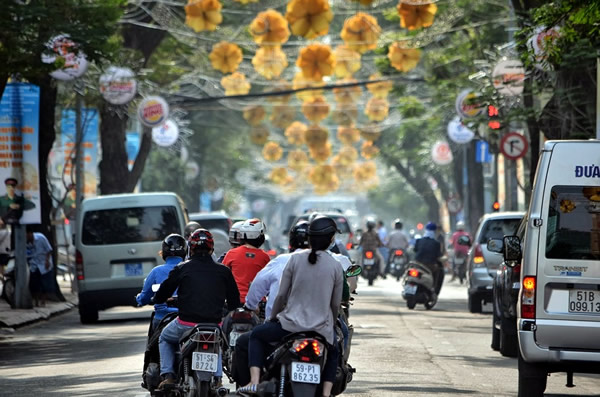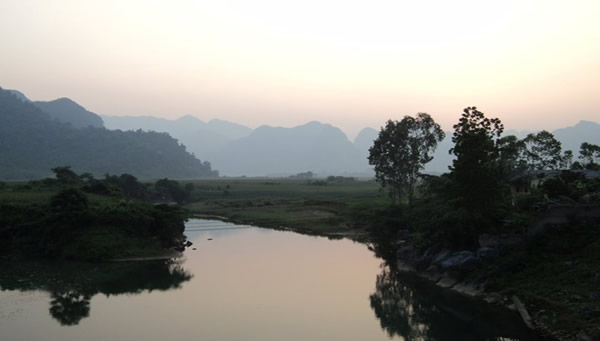Living and Teaching English in Ho Chi Minh City, Vietnam
How to Immerse Yourself
in HCMC
By Angharad Bates
3/1/2013 resources updated 10/27/2023 by
TransitionsAbroad.com

|
|
A street scene in HCMC.
|
I was on the back of an old Russian motorbike, which growled into the wind. I was dressed in a t-shirt and shorts and feeling the usual twangs of fear when traveling fast in any vehicle. Nevertheless, I couldn't have been happier. The sun shone down on us as we wound our way along roads that skirted the edges of limestone Karst Mountains, which rose out of the ground like the humps of some mighty dragon. Every now and again, the land would level out, and a patchwork of emerald rice paddies, surrounded by flowers, would be laid out before us. I was relieved to see this side of the country, to be out and on the open road; everything seemed so different compared to life in HCMC city.

|
|
Mountain countryside outside of bustling HCMC. Photo by Angharad Bates.
|
I often lived in the bustling metropolis of HCMC when all I wanted to do was leave what I felt to be a polluted mess. I longed for parks, beautiful buildings, and less traffic and mayhem. People seemed to drink too much while others were mugged. At other times, the raw energy of life played out in the streets instilled awe and inspiration. I would drive home from work fully appreciating the chance to live in such a fantastic part of the world.
We decided to move to Vietnam after a friend recommended the country. She had the most remarkable time. She even saved some money in the bargain, a winning combination by most standards. It took a while to find enough work hours to suit us, but only a few days to find a nice apartment and a roommate. I went on to stay for two years.
Near the end of my time in HCMC, a friend decided to drive to Hanoi, an epic adventure that would last for a week. The voyage instilled a newfound love for Vietnam and the Vietnamese people. Now that I am no longer there, I dearly miss the mayhem, the traffic, and the strength of the people. I yearn to go back. I suppose everyone who lives in a place for some time has just as many experiences that create paradoxical sentiments when moving to a new and far away home.
Finding Work in HCMC
HCMC, the central part of which is still referred to as Saigon, is a frenetic city by anyone's estimation. Capitalism and communism come together to form an intriguing blend of perspectives. Across the city, temples jostle for space with shopping malls. Street food vendors hawk their wares outside costly office blocks. The city is a good choice for a stint abroad for several reasons:
-
There are jobs
-
Wages are relatively high
-
The cost of living in Vietnam is comparatively cheap
-
There is an expat community to help with the transition
Those looking for work should note that the key is to put in a lot of legwork (or motorbike work, as the case may be) to find a job. Many language schools prefer to see prospective teachers in person. Most don't hire from abroad, and many are hopeless at replying via email anyway.
Arriving without prearranged work may seem like a daunting prospect. Yet, if you hand out enough CVs and have reasonable credentials, you are almost sure to find a job. The best thing to do is to check the addresses of ten or so schools and pay a Xe Om (motorbike taxi) to take you to each one to speak to them in person. A couple of hours being driven should be 5 dollars, which is a good investment. The other advantage of directly approaching schools is that you can develop first-hand impressions of how the building and classrooms appear, how professional and friendly the staff seems, and catch sight of some of your prospective students.
Wages are normally around US$12-$20 an hour, depending upon qualifications and experience, with a lucky few securing up to $30 for private business classes. Although it is generally required that teachers have a degree and a CELTA/TESOL certificate, it is still perfectly feasible to find work without such credentials, albeit usually at some of the less scrupulous schools at slightly lower wages.
The same can be said about work permits. Only those schools in the upper echelons of the education industry will require teachers to acquire a work permit. Most will allow teachers to work on an easily renewable tourist visa simply because the cost and bureaucracy of applying for a permit would otherwise put potential teachers off.
Of course, apart from language schools, you can also organize your own private classes. These often pay more and are usually one-on-one. The most common way to set up such lessons is through word of mouth. If you stay in the city long enough, someone is bound to ask you for such lessons, and if you are good, news spreads fast. Once you make inroads into the private class sector, things can become very convenient, as many of the affluent in cities live together in suburban tower blocks. Therefore, you may get fortunate and work a few hours a day in the same place, cutting down on travel time and money..

|
|
Playful children making faces for the camera. Photo by Angharad Bates.
|
Where to Live in HCMC
HCMC offers a spectrum of accommodation options, from US$3,000 a month luxury penthouses to rooms in shared houses for US$50. If you're looking for a decent apartment for a couple of people, expect to pay around US$400, depending on where you want to be.
The city is split into different districts, with 1 and 3 being the most central. Both comprise a nice mixture of shops, restaurants, and hotels. Those on the main streets are more exclusive, while stores become more local as you head into the back alleys. This means you can have the best of both worlds, indulging in a 3-course French meal served on a rooftop one day and sampling cheap local delicacies the next. District 1 also houses the backpacker district of Pham Ngu Lao, an excellent place to meet foreigners, network, and get advice. Being central, these are also some of the most expensive areas, but you pay for convenience and the modern ambiance. It's easy to sit in a bar in Pham Ngu Lao or District 3, meet potential housemates, or learn about jobs.
If, on the other hand, you like greater cultural immersion, Districts 4 and 5 will offer you that experience, coupled with a cheaper price tag.
District 4 is across the river, and due to being the site of the former port, it has retained an atmosphere reflecting its previously dodgy reputation. However, since it's no longer a port, and the unsavory characters sometimes found in ports have moved out, the reality is now wholly unfounded. I lived there for a year and found it cheap and cheerful.
District 5 is home to Chinatown, making it a colorful place to live, stroll, and browse. There is plenty of good shopping, hundreds of hole-in-the-wall restaurants, and street vendors.
Skipping straight to the other end of the spectrum, you should consider Anh Phu if you feel you might want to escape from the raw street energy on occasion. It's quite a drive across two bridges. Yet, you emerge into a far more open plan amid a calm oasis of luxurious apartments and upscale restaurants. There's also a range of social clubs here for new mothers and those interested in yoga or meditation, among other things.
Finding accommodations is relatively easy. Apart from word-of-mouth recommendations, there are a plethora of agents who work specifically with and for foreigners. This significantly eases the stress of arriving in a new city and helps handle the language barrier.
Once you have settled in, the only thing left to do is rent yourself a motorbike, take a deep breath, and explore the city.
Angharad Bates has returned from Vietnam and retreated to the more soporific realm of the London suburbs. While flitting between Southern Spain, Sweden, and the UK, she manages to split the remaining few days working as an English teacher and a part-time travel writer. She is optimistic about a move to Andalucía to live in a yurt.
|
